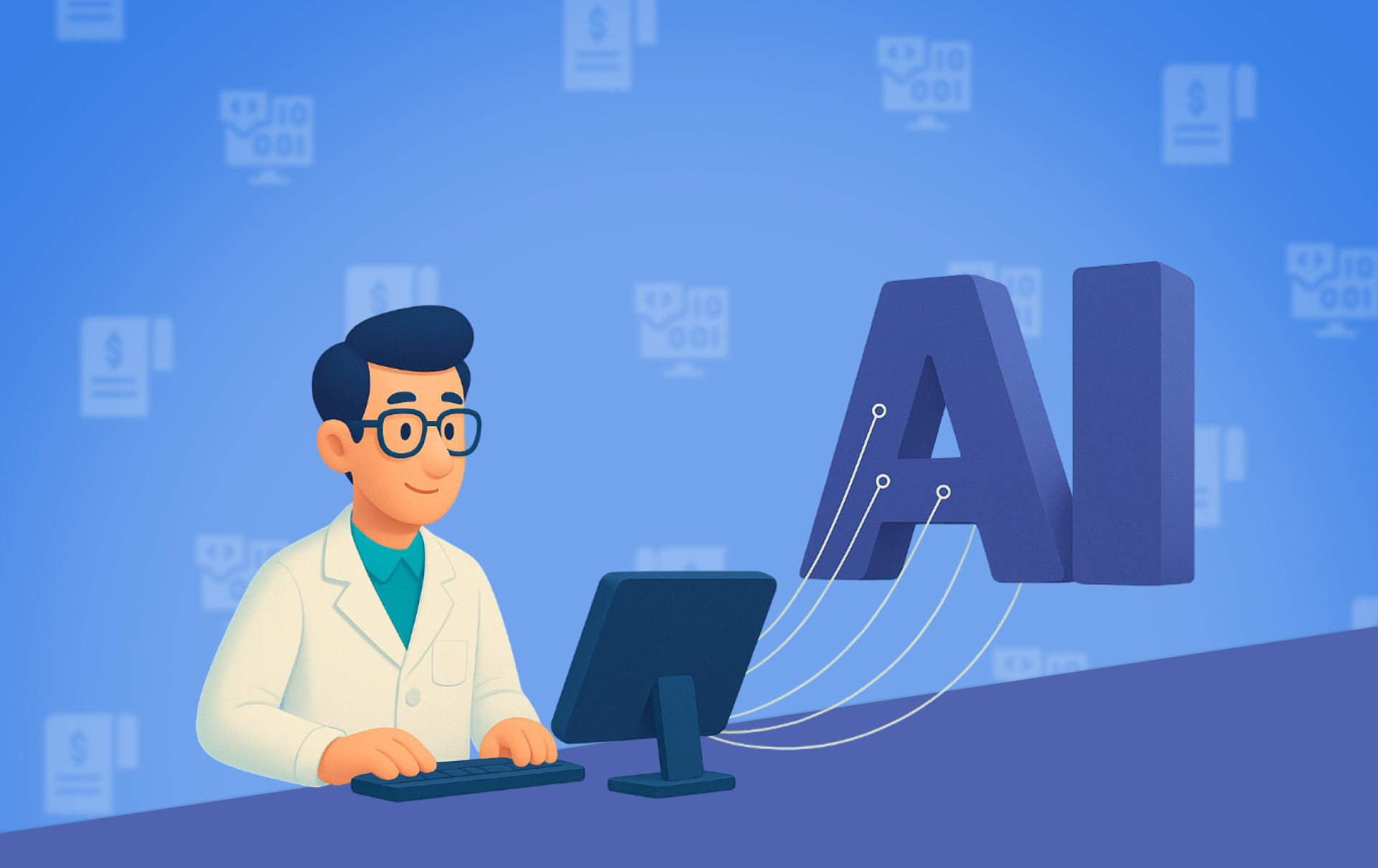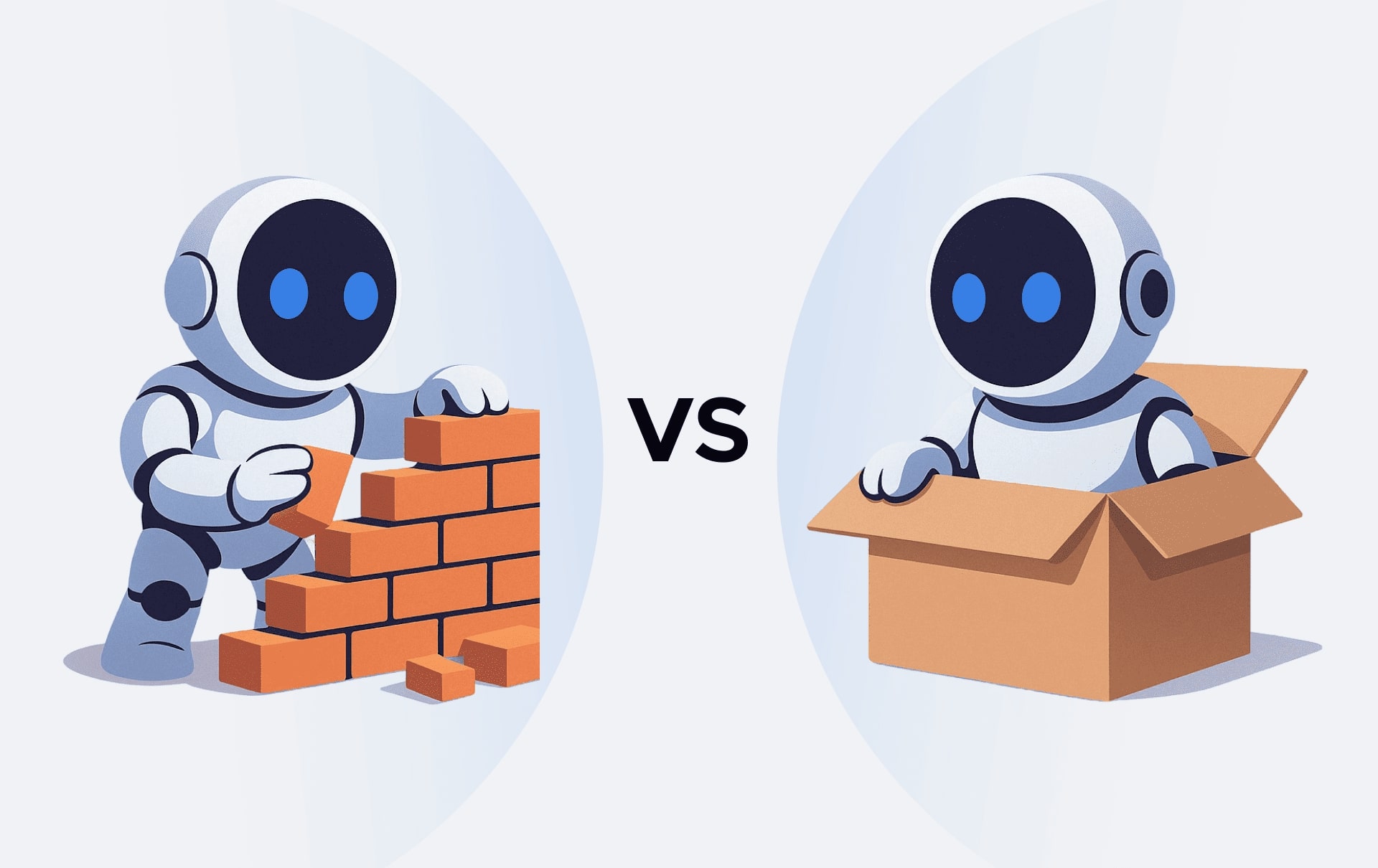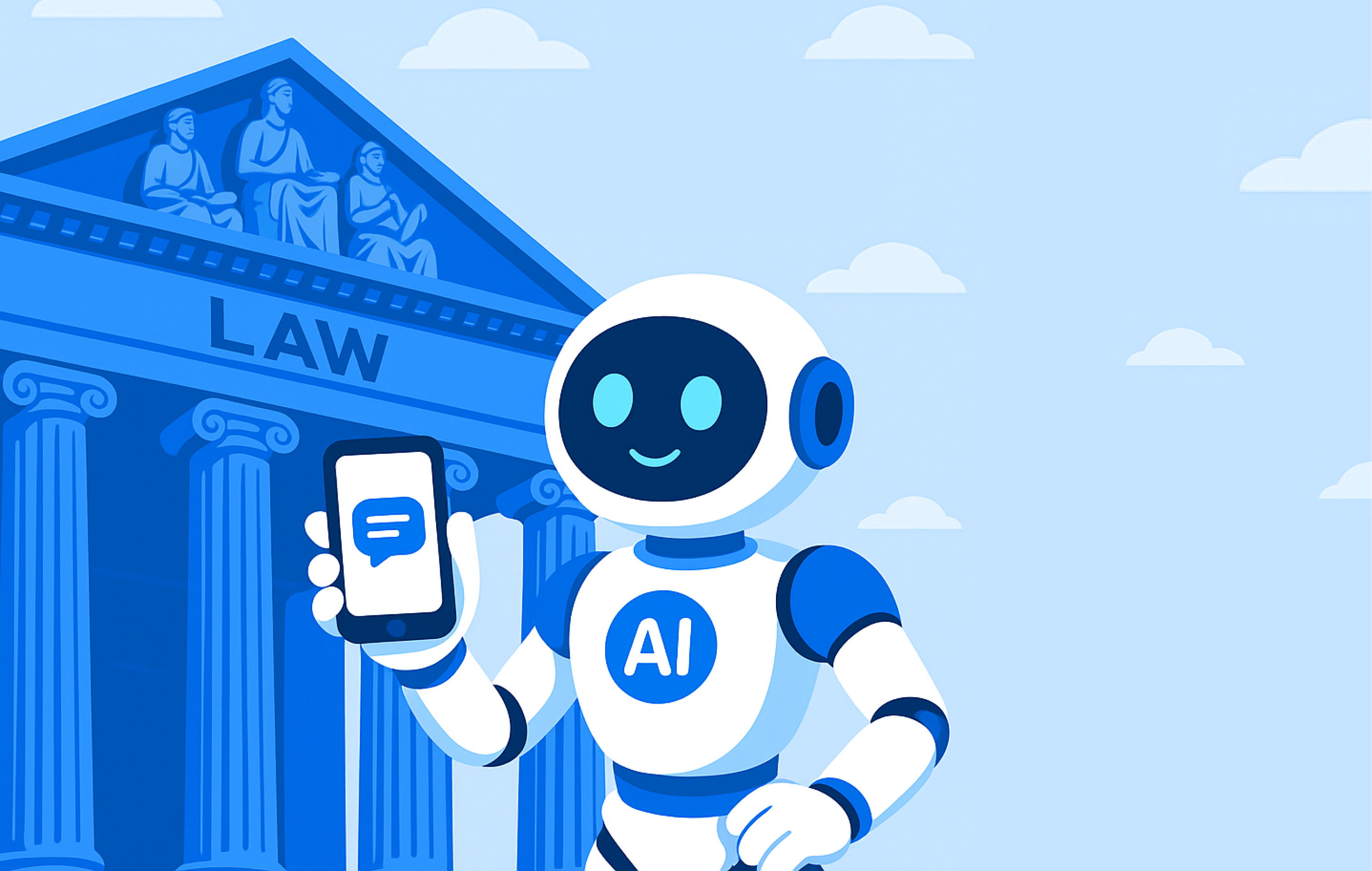How Firms Can Use Generative AI for Lawyers to Their Advantage
How generative AI for lawyers is transforming the industry for lawyers, the courtroom, consumers, education, and the future of law practice.
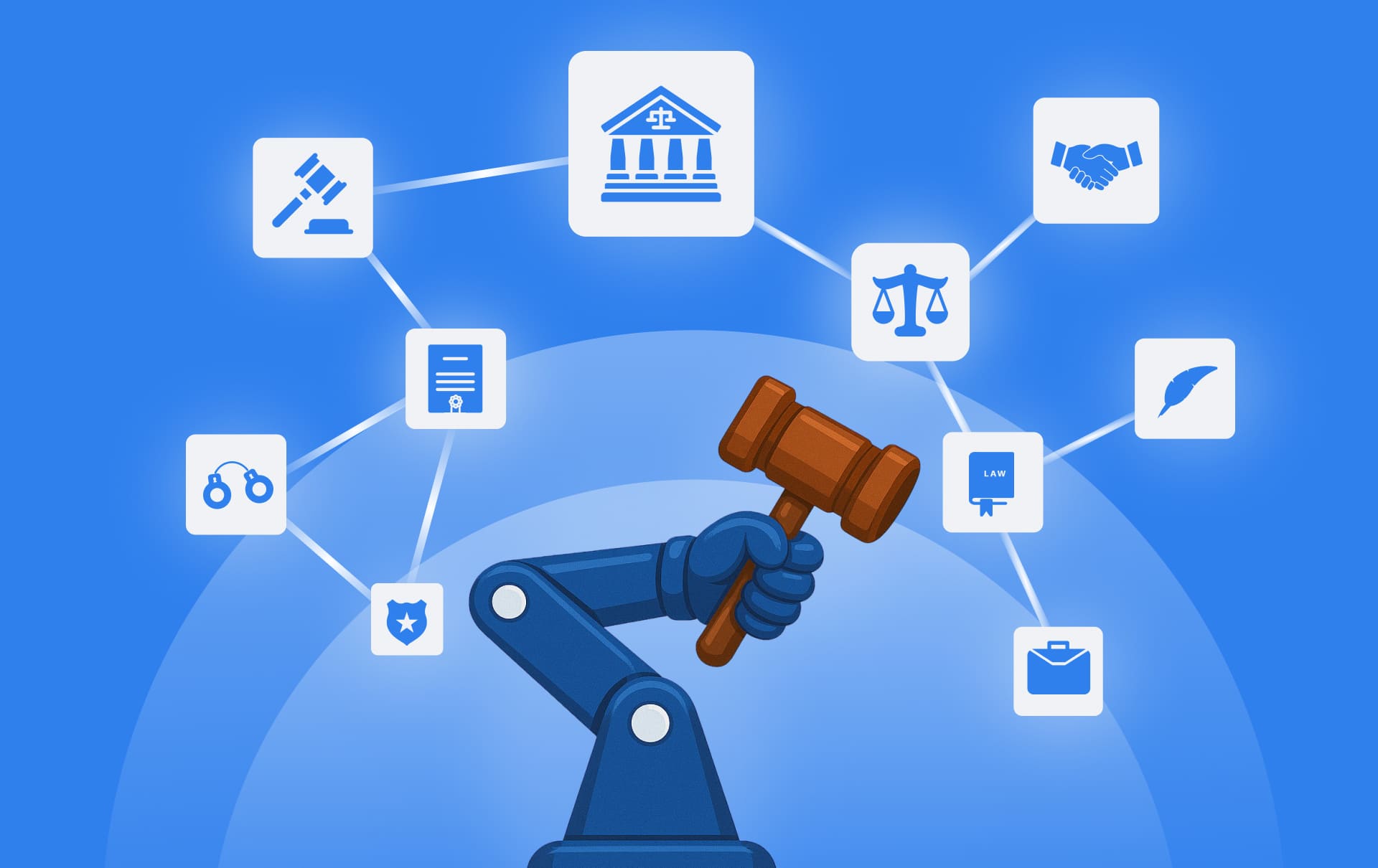
In 2023, Clio's Legal Trends Report found that only 19% of professionals were using generative AI for lawyers. Just a year later, the landscape has transformed: 79% of legal professionals now use AI in some capacity and 25% report widespread or universal use across their law firm artificial intelligence operations.
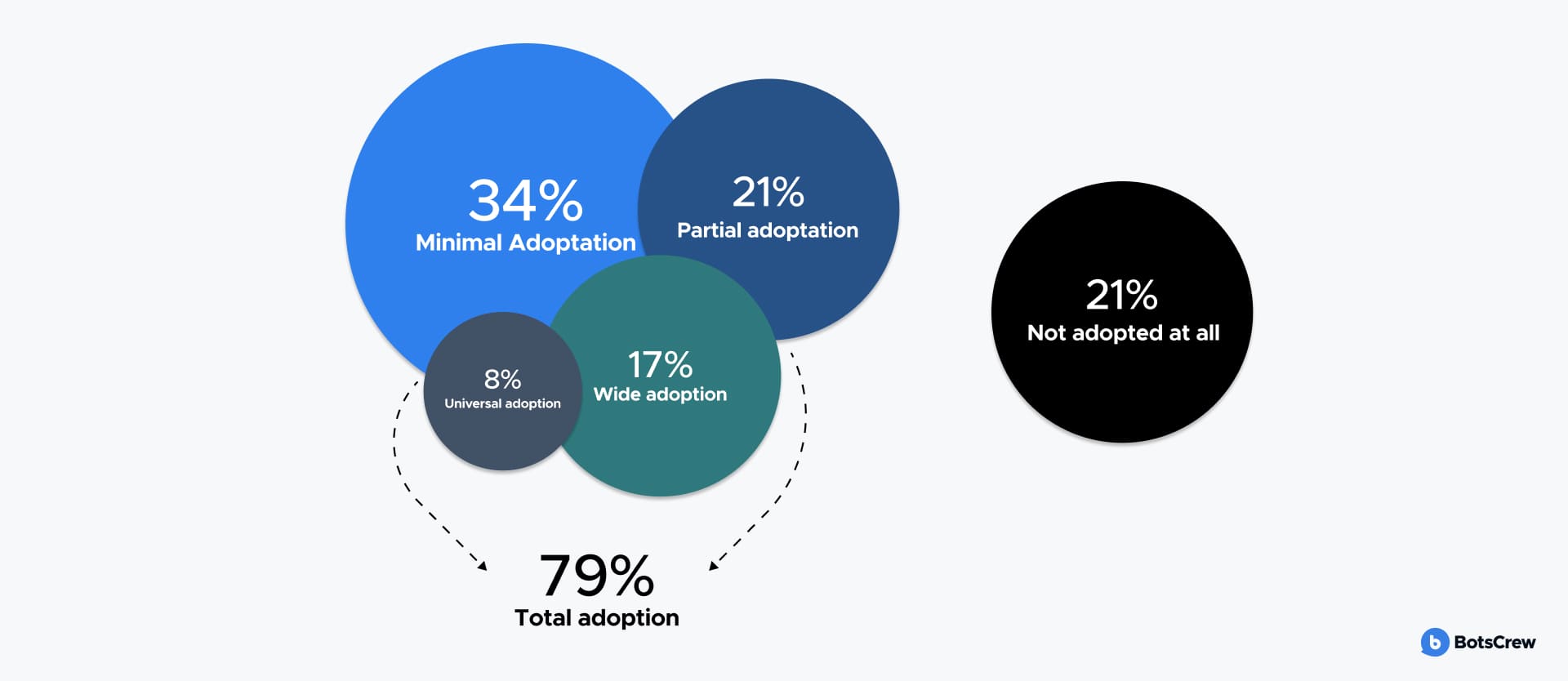
Additionally, according to the Future of Professionals Report, AI for paralegals could free up 4 hours per week for legal professionals in the next year, and up to 12 hours weekly over the next five years. That's roughly 200 extra hours per year per lawyer — the equivalent of adding a full-time colleague for every 10 legal team members.
Efficiency doesn't just mean faster work — it means more revenue. Generative AI for lawyers could generate $100,000 in new billable hours per U.S. lawyer annually. Multiply that across even a modest firm, and you are looking at a six- or seven-figure impact.
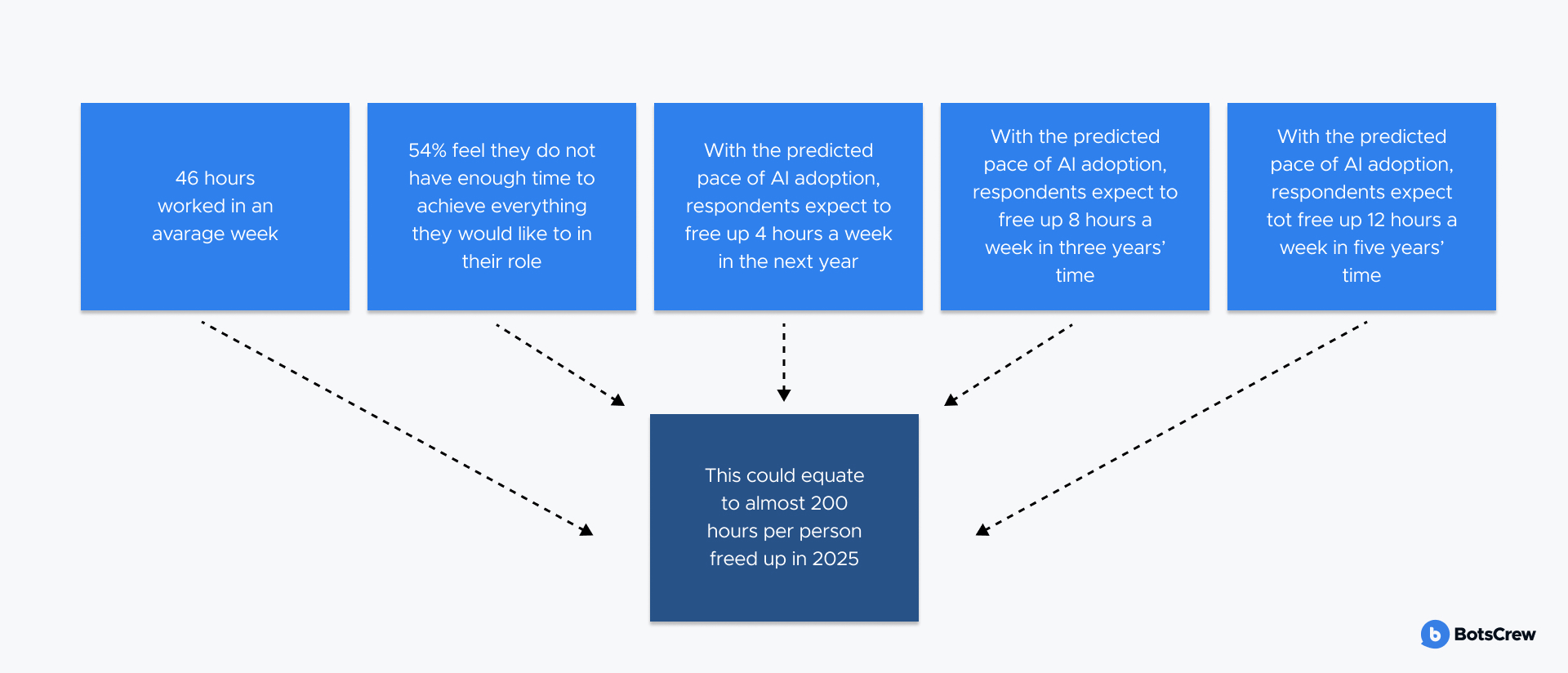
Law firms using artificial intelligence today are investing in scalable operations, deeper client relationships, stronger competitive positioning, and more satisfied legal teams. Keep reading the article to discover how leading law firms are using AI to sharpen their legal research, streamline case management, automate administrative grunt work, and even predict case outcomes with startling accuracy.
4 Ways Artificial Intelligence Law Firm Tools Can Benefit Your Law Practice
Legal specialists are increasingly embracing generative AI not just as a novelty, but as a productivity multiplier and strategic enabler.
Professionals surveyed in the Future of Professionals Report highlighted several high-impact areas where they see the most promise in AI for legal document review technologies:
- More efficient handling of large volumes of legal data (59%)
- Faster response times for clients (41%)
- Reduced risk of human error (35%)
- Access to advanced analytics for better decision-making (33%).
1️⃣ Handling Large Volumes of Legal Data More Effectively (59%)
Legal professionals are drowning in data — from case precedents and court rulings to discovery documents, statutes, and client records. AI doesn't just make it faster to comb through this information; it transforms how legal teams engage with it.
AI legal document analysis tools like machine learning-based document classifiers, semantic search engines, and predictive coding in e-discovery allow firms to uncover key facts, relationships, and risks that may not be apparent through manual review.
For instance, in complex litigation, AI can automatically surface the most relevant prior rulings, detect conflicting clauses across hundreds of contracts, or flag noncompliant language in regulatory filings. This capability accelerates research while enhancing the quality and defensibility of legal work.
For law firms, the strategic benefit is clear: by extracting intelligence from massive data sets, attorneys can offer more informed counsel and respond to legal developments faster than competitors still relying on traditional research methods.
2️⃣ Improving Client Response Times
Speed matters in client service — and delays in communication often translate to lost trust or lost business. AI bridges this gap by enhancing responsiveness across the client journey. Virtual legal assistants and AI chatbots can triage inquiries, handle basic legal questions, and gather client intake information before a human attorney even steps in.
On the backend, AI helps lawyers rapidly generate tailored responses by suggesting language based on previous cases or similar client scenarios, reducing time spent drafting emails or legal memos.
Additionally, AI-integrated client relationship management (CRM) tools can alert legal teams to missed follow-ups or changes in client status — allowing firms to proactively reach out and stay engaged. The result is a more seamless, responsive client experience that builds loyalty and increases client retention.
Deploy AI with confidence. We help law firms integrate ethical, explainable, and private-by-design solutions.
3️⃣ Reducing Human Error
Accuracy is critical in law. A single oversight in a contract, brief, or filing can have major financial or legal consequences. AI minimizes this risk by acting as a second set of eyes — constantly scanning for inconsistencies, omissions, and anomalies that a busy lawyer might miss.
AI tools like contract analysis platforms and compliance engines can cross-check documents against hundreds of regulations or previous agreements in real time, flagging problematic clauses, outdated terms, or missing elements. For instance, AI can highlight that a non-compete clause violates local employment law, or that a merger agreement lacks a required indemnity section.
By automating these checks, law firms not only reduce exposure to malpractice but also increase the quality of deliverables — strengthening client trust and protecting the firm’s reputation.
4️⃣ Providing Advanced Analytics for Decision-Making
The rise of data-driven lawyering is reshaping everything from litigation strategy to business development. AI-powered analytics platforms can now analyze historical case data, judicial behaviour, and opposing counsel patterns to help lawyers predict case outcomes, assess settlement viability, or choose the most effective argumentation approach.
Beyond the courtroom, AI can also offer firm-level insights: analyzing billing trends, client engagement patterns, and lawyer productivity to uncover opportunities for operational improvement or new service offerings. For example, a firm might use AI analytics to spot that certain types of matters result in lower margins — and then decide whether to automate them, price them differently, or stop offering them altogether.
This kind of strategic foresight turns legal data into a business asset — enabling firms to run more like data-savvy consultancies than traditional practices.
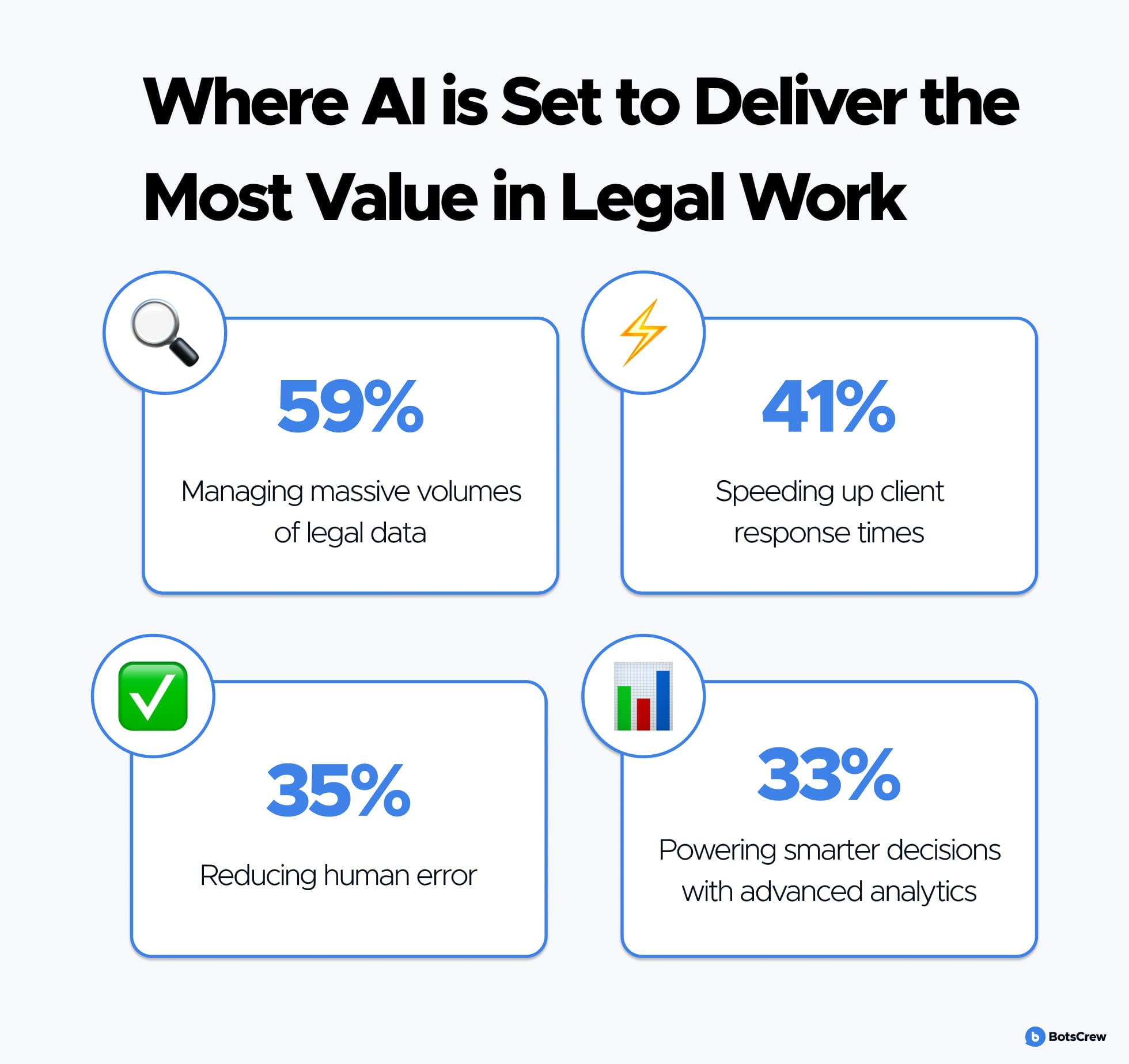
How Is AI Being Used in the Legal Industry
According to the 2024 Legal Ops and Tech survey, the top six use cases for AI and law firms today include:
Conducting Legal Research
Traditionally, legal research is time-intensive, with attorneys combing through case law, statutes, regulations, and secondary sources to build arguments. AI is dramatically transforming this process.
AI-powered research tools use natural language processing to understand context. This allows them to interpret complex queries, find factually or legally analogous cases, and even summarize judicial reasoning.
Instead of spending 8 hours manually digging through precedent, a lawyer can now ask an AI-powered platform:
"What are the most recent rulings on employee non-solicitation clauses in California post-2024?"
The system returns tailored case summaries with citations, saving hours while improving precision.
Drafting and Templating Legal Contracts
AI is also a powerful assistant when it comes to generating first-draft contracts or customizing templates. Platforms allow firms to automate the creation of NDAs, employment agreements, or service contracts by simply filling in key business terms. They also learn from past contracts to improve template logic and recommend clause alternatives.
A corporate associate drafting a SaaS agreement can use AI to automatically populate standard terms and receive suggestions to adjust the limitation of liability clause based on similar negotiated deals in the same jurisdiction. This means less time starting from scratch and more time focusing on negotiation strategy.
Summarizing Legal Narratives
Whether summarizing deposition transcripts, witness statements, or complex discovery files, AI excels at condensing dense legal narratives into digestible insights. AI tools can extract key facts, parties, dates, and events from hundreds of pages in minutes, helping legal teams prepare for litigation faster.
During a document review in a class-action lawsuit, an AI engine summarizes hundreds of client declarations into patterns (e.g., common complaints, timelines, inconsistencies), helping lawyers shape a stronger narrative ahead of trial or mediation.
Reviewing Legal Documents
AI for legal document review is becoming a trusted reviewer — especially for contracts, lease agreements, and compliance-related documents. AI engines can identify missing clauses, risky language, or non-compliant terms, reducing both review time and legal exposure.
A mid-sized firm using AI-based solutions for M&A due diligence can process 1,000 contracts and flag 120 for deeper review — because they contain change-of-control clauses or termination risks.
Negotiating and Redlining Contracts
While this is still an emerging space, AI is beginning to assist with real-time contract negotiation — offering redline suggestions, highlighting clause deviations, and benchmarking positions based on past deals. Tools integrate directly into Microsoft Word and offer clause-by-clause AI suggestions during negotiations, drawing from both firm-preferred language and broader industry norms.
A general counsel using AI to negotiate an enterprise procurement agreement receives automated redlines that suggest fallback language for indemnity and insurance clauses — reducing the need for back-and-forth between outside counsel and the vendor.
eDiscovery
Generative AI and law have long been game-changers in eDiscovery, but newer AI models have taken it to the next level with predictive coding, sentiment analysis, and intelligent clustering of documents. AI-powered platforms can now ingest millions of emails or files, automatically surface relevant material, detect privilege, and uncover hidden relationships between custodians and data points.
In a regulatory investigation involving years of email data, an AI-driven eDiscovery tool uncovers that a previously overlooked custodian used code words to discuss off-book transactions. AI picked up on sentiment shifts and irregular communication patterns — something a human reviewer might have missed.

Judges in India and Colombia are even using ChatGPT to help justify their reasoning and answer legal questions, respectively.
What Are the Risks of Using AI in Legal Work?
While some of the professionals in the legal industry believe generative AI can be used ethically, a significant majority express concern over a range of risks. These concerns — ranging from hallucinations and data privacy to bias and intellectual property — must be carefully weighed before integrating AI into legal workflows. Here is what to consider:
Bias and Fairness: The Algorithmic Blind Spot
AI systems are only as good as the data they are trained on — and therein lies the problem. Historical legal data may encode biases, particularly racial or socioeconomic, which AI systems can unknowingly perpetuate.
A 2023 study revealed that more than 50% of legal professionals witnessed racial biases in action, directed primarily towards black court users. This presents not just a legal risk, but a reputational one for firms and courts alike.
Action Point: Choose AI tools that disclose how they mitigate bias in training and labeling data. Demand transparency from vendors.
Accuracy and Explainability: Trusting the Black Box
Legal professionals cite accuracy as the top barrier to Generative AI in law adoption, according to the 2022 ABA Legal Technology Survey. Many AI systems operate as "black boxes," making decisions or generating content without clear, explainable logic. This is particularly dangerous in legal contexts where AI-generated errors — such as incorrect translations in court — can influence case outcomes and risk compliance violations.
A study by Stanford's Institute for Human-Centered Artificial Intelligence found that general-purpose AI models hallucinated between 58% and 82% of the time on legal queries.
Action Point: Require explainability in AI models. Avoid systems that lack transparency into decision-making processes.
Data Privacy and Confidentiality: Hidden Exposure
AI platforms process vast volumes of sensitive information — from confidential client records to proprietary strategies. Yet many tools, including popular ones like ChatGPT, retain user inputs unless specifically configured otherwise.
In 2023, Microsoft's AI research division inadvertently exposed 38 terabytes of sensitive internal data due to a misconfigured Azure Shared Access Signature (SAS) token embedded in a public GitHub repository.
The repository, intended to share open-source AI models for image recognition, included a URL that granted full access to the entire Azure storage account instead of limiting access to specific files. That's a cautionary message underscoring the importance of robust data privacy protocols when selecting AI vendors.
Action Point: Implement policies to prevent the accidental input of client-sensitive data into public or third-party AI systems. Prioritize tools that explicitly do not train on user data.
Intellectual Property: Who Owns AI-Created Work?
In legal domains involving contracts, patents, or creative works, questions of authorship become thorny. Courts have already ruled that AI-generated content cannot be copyrighted unless significant human input shapes the final result. This has broad implications for legal drafting, marketing content, and client deliverables created using generative AI.
In 2023, at least 12 lawsuits were brought against generative AI companies raising copyright infringement and related claims. Almost all of these are putative class actions brought by authors or visual artists, seeking money damages on behalf of some defined class of people whose copyrighted works were used to train the defendant's AI model.
Action Point: Establish internal IP policies that define human involvement in AI-generated outputs. Constantly monitor legislation.
As regulation evolves and client expectations around data security intensify, decision-makers must take a proactive stance. The firms that thrive will be those that embed AI within a framework of accountability, transparency, and ethical oversight.
How a Reliable Vendor Can Help Law Firms Avoid AI Pitfalls
A reliable AI custom solution vendor becomes a game-changer when it comes to concerns associated with AI's biased outputs, hallucinated case law, data breaches, and unclear IP ownership.
#1. Tailored Models, Built on Trusted Data. A reputable vendor doesn't just hand you a pre-trained model. Instead, they collaborate with your legal team to build or fine-tune AI systems on carefully curated, firm-specific data. This minimizes the risk of bias baked into general public datasets and ensures the outputs align with your jurisdiction’s laws, tone, and practice standards.
#2. Transparent Architecture and Explainability. Unlike black-box tools, custom AI vendors can deliver models with explainability built-in — offering insight into how decisions are made and what sources are cited. This is essential for defending AI-assisted outputs in legal proceedings or internal audits.
#3. Privacy and Compliance by Design. A strong AI vendor understands legal-sector sensitivities and implements privacy-first architecture. This includes:
- Keeping client data on-shore or on-prem
- Using non-trainable inference-only models
- Encrypting all inputs and outputs
- Providing clear documentation on how data is handled.
#4. IP Ownership and Human-in-the-Loop. Custom solution partners help define how much human input goes into the AI-generated content and ensure you retain full intellectual property ownership. They also offer tools to keep a human-in-the-loop, which is critical in legal workflows where nuance and accountability matter.
#5. Ongoing Support and Model Governance. AI isn't "set it and forget it." A reliable vendor provides long-term support — including model audits, performance reviews, and regulatory updates — to ensure your tools stay compliant and effective as the tech and laws evolve.
Partnering with a trusted AI vendor ensures your firm reaps the benefits without risking your clients' trust, your reputation, or your compliance standing.
Success Story: How We Helped a Law Firm Automate and Scale Their Legal Workflows
Legal innovation doesn't happen by accident. It is born when vision meets the right tech partner. One of our standout collaborations was with an Australian mid-sized corporate law firm that wanted to streamline high-volume contract work, reduce research time, and make legal advice more accessible to clients and internal teams alike.
The firm's partners were facing growing operational inefficiencies. Paralegals and associates were bogged down with repetitive tasks: reviewing NDAs, conducting due diligence, and drafting low-complexity agreements — work that took up valuable billable hours and slowed responsiveness to clients.
They needed an AI-powered solution that would:
- Automate first-draft generation of legal documents
- Summarize lengthy legal texts and contracts
- Search and retrieve case-specific data across thousands of documents
- Stay secure and compliant with confidentiality requirements.
And — most importantly — it had to work in a real-world legal environment, not just in theory.
We developed a custom AI legal assistant called Ailira tailored to the firm's internal workflows. The tool combined natural language processing (NLP), secure document parsing, and an intuitive interface that allowed lawyers to interact with legal data like never before.
Key capabilities included:
- Smart document automation that generated contract drafts in seconds
- Legal research assistant that summarized precedents and flagged key risks
- Secure integration with the firm’s document management system (DMS)
- Internal chatbot for quick Q&A and data lookup across previous cases.
Unlike off-the-shelf tools, this system was trained on the firm's templates, case history, and tone of communication — ensuring output quality and reducing the need for rework.
In the first 90 days:
✅ Research time per case dropped by 62%
✅ First-draft creation for standard agreements accelerated by 5x
✅ Associates reported a 30% reduction in low-value tasks, freeing them to focus on strategic work
✅ Clients noticed faster turnaround and improved service consistency.
The firm now uses the AI assistant firm-wide, including in their intake process, helping triage inquiries and guiding clients to the right team. As regulations shift and the legal landscape evolves, we continue to support and retrain the model with the firm's updated data and best practices.
Ready to Bring Ethical, Reliable AI Into Your Firm? Partner with a trusted AI solutions provider that understands the legal industry, builds with compliance in mind, and delivers custom models tailored to your workflows.






